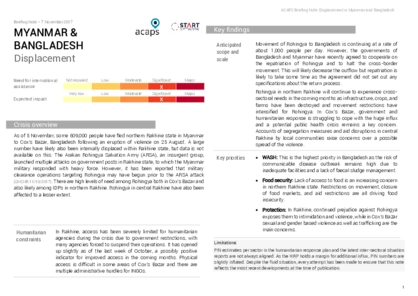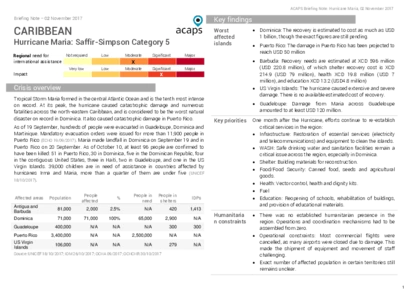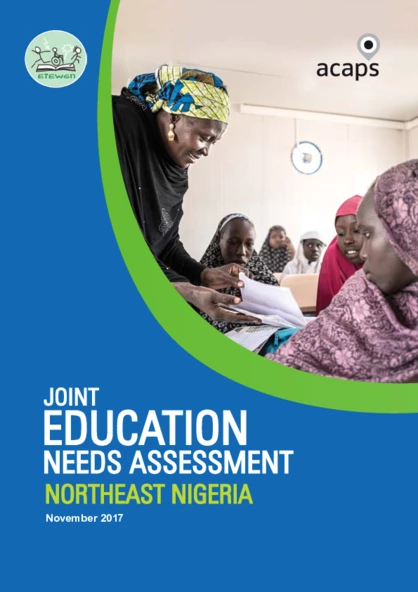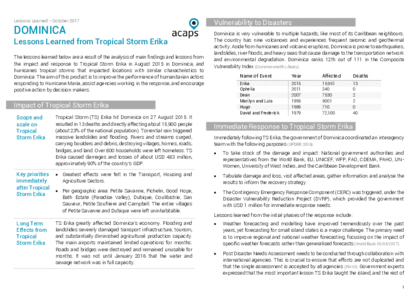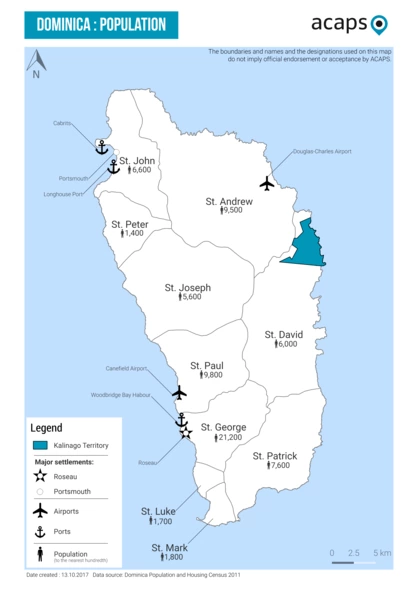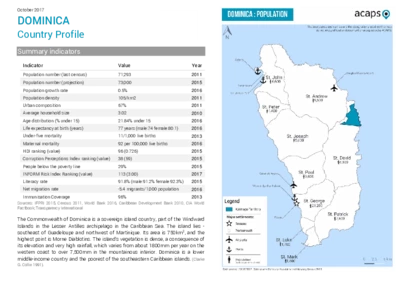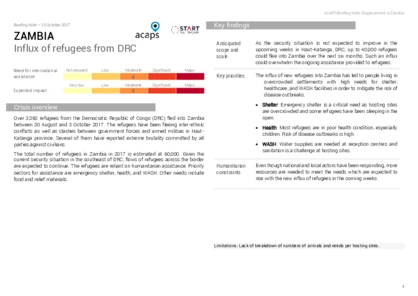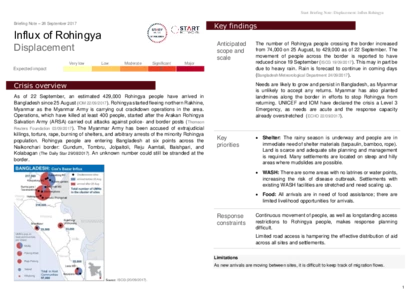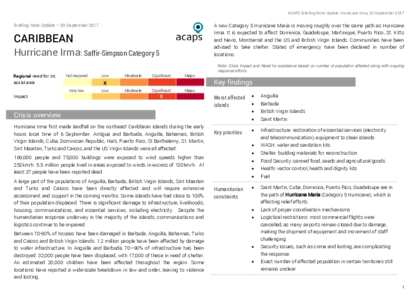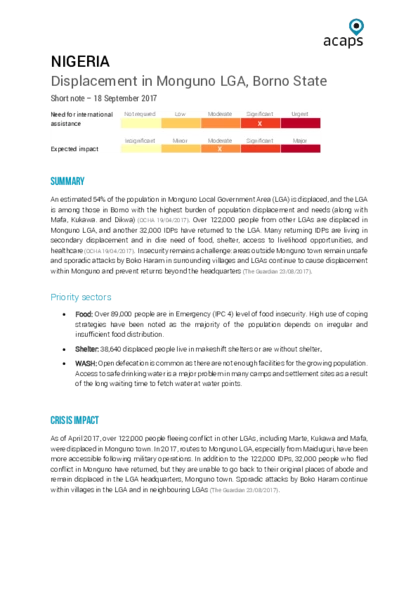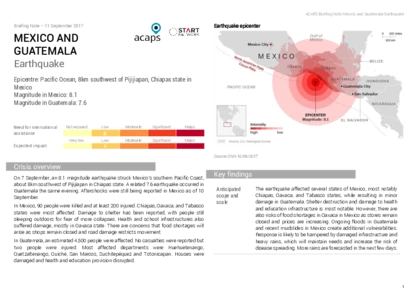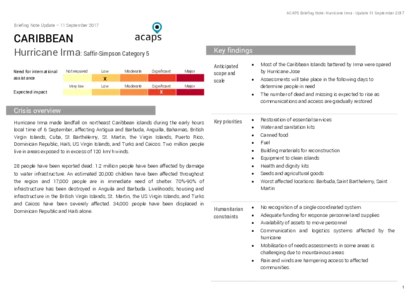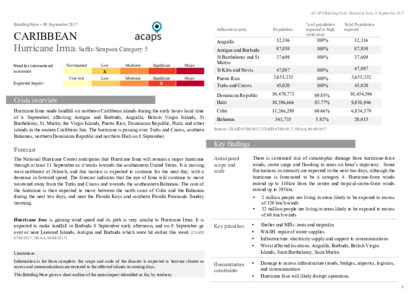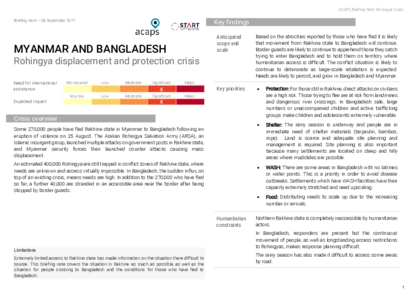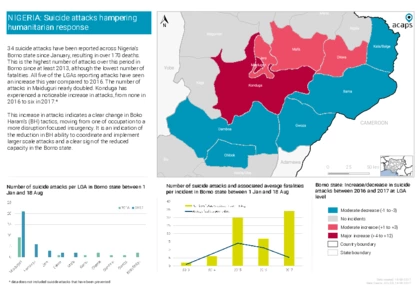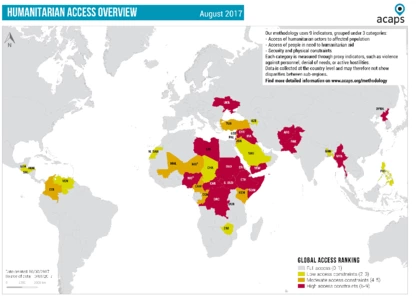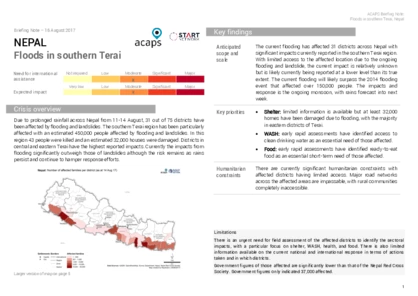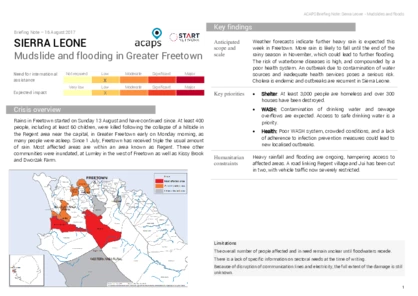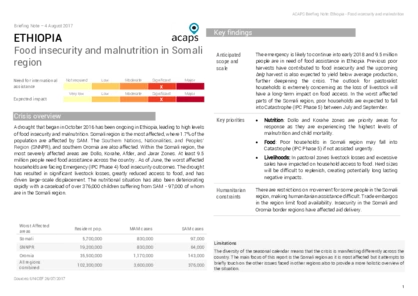Explore our
analysis products
archive
07 November 2017
Myanmar and Bangladesh: Rohingya Displacement
DOCUMENT / PDF / 358 KB
As of 5 November, some 609,000 people have fled northern Rakhine state in Myanmar to Cox’s Bazar, Bangladesh following an eruption of violence on 25 August. A large number has likely also been internally displaced within Rakhine state, but data is not available on this.
02 November 2017
Caribbean: Hurricane Maria
DOCUMENT / PDF / 2 MB
Tropical Storm Maria formed in the central Atlantic Ocean and is the tenth most intense on record. At its peak, the hurricane caused catastrophic damage and numerous fatalities across the north-eastern Caribbean, and is considered to be the worst natural disaster on record in Dominica. It also caused catastrophic damage in Puerto Rico.
01 November 2017
Nigeria: Joint Education Needs Assessment
DOCUMENT / PDF / 2 MB
While over the last 12 months there has been some improvement in terms of education service provision in the three northeast Nigerian states most affected by the ongoing insurgency, there are still significant barriers for many children. The assessment looks at the situation across three main levels of the formal education sector as well as analysing the influence of the security situation, and accessibility to livelihoods and a ‘normal life’.
24 October 2017
Dominica: Lessons Learned from Tropical Storm Erika
DOCUMENT / PDF / 332 KB
The lessons learned are a result of the analysis of main findings and lessons from the impact and response to Tropical Storm Erika in August 2015 in Dominica, and hurricanes tropical storms that impacted locations with similar characteristics to Dominica. The aim of this product is to improve the performance of humanitarian actors responding to Hurricane Maria, assist agencies working in the response, and encourage positive action by decision makers.
19 October 2017
Dominica: Population (map)
DOCUMENT / PDF / 2 MB
Pouplation: 71,200 (2011); 67% of people live in urban areas; growth 0% per annum 1990–2012, due mainly to the emigration of young people; birth rate 16 per 1,000 people (est. 26 in 1970); life expectancy 77 years (The Commonwealth). The population is mostly of African and mixed African/European descent, with European, Syrian and Carib (2.9% in 2001 census) minorities. There is a Carib reserve on part of the east of the island, referred to as the Kalinago Territory
19 October 2017
Dominica: Country Profile
DOCUMENT / PDF / 387 KB
The Commonwealth of Dominica is a sovereign island country, part of the Windward Islands in the Lesser Antilles archipelago in the Caribbean Sea. Dominica is vulnerable to a wide range of natural hazards. The most common and historically most significant are tropical storms and hurricanes. This country profile expands on background information such as the society, the history, economy, infrastructure, and the politics, as well as baseline sectoral information.
13 October 2017
Zambia:Influx of refugees from DRC
DOCUMENT / PDF / 307 KB
Over 3,360 refugees from the Democratic Republic of Congo fled into Zambia between 30 August and 3 October 2017. The refugees have been fleeing inter-ethnic conflicts as well as clashes between government forces and armed militias in Haut-Katanga province. Several of them have reported extreme brutality committed by all parties against civilians.
26 September 2017
Bangladesh: Displacement Influx of Rohingya
DOCUMENT / PDF / 354 KB
As of 22 September, an estimated 429,000 Rohingya people have arrived in Bangladesh since 25 August. Rohingya started fleeing northern Rakhine, Myanmar as the Myanmar Army is carrying out crackdown operations in the area. Operations, which have killed at least 400 people, started after the Arakan Rohingya Salvation Army carried out attacks against police- and border posts.
20 September 2017
Update 2 - Caribbean: Hurricane Irma
DOCUMENT / PDF / 383 KB
Hurricane Irma first made landfall on the northeast Caribbean islands during the early hours local time of 6 September. 169,000 people and 75,000 buildings were exposed to wind speeds higher than 252km/h. 5.5 million people lived in areas exposed to winds in excess of 120km/h. At least 37 people have been reported dead.
19 September 2017
Movement back to Syria: scenarios
DOCUMENT / PDF / 562 KB
ACAPS and the Mixed Migration Platform have produced a new set of scenarios, outlining possible developments in Syria and neighbouring countries over the next nine months. Following scenario-building workshops, five scenarios were identified. The report outlines triggers that could drive these scenarios, as well as the impact and humanitarian consequences of each scenario.
18 September 2017
Nigeria: Displacement in Monguno LGA, Borno State
DOCUMENT / PDF / 134 KB
An estimated 54% of the population in Monguno Local Government Area (LGA) is displaced, and the LGA is among those in Borno with the highest burden of population displacement and needs. Over 122,000 people from other LGAs are displaced in Monguno LGA, and another 32,000 IDPs have returned to the LGA. Many returning IDPs are living in secondary displacement and in dire need of food, shelter, access to livelihood opportunities, and healthcare.
12 September 2017
Mexico and Guatemala: Earthquake
DOCUMENT / PDF / 215 KB
On 7 September, an 8.1 magnitude earthquake struck Mexico’s southern Pacific Coast, about 8km southwest of Pijijiapan in Chiapas state. A related 7.6 earthquake occurred in Guatemala the same evening. In Mexico, 90 people were killed and at least 200 injured. In Guatemala, an estimated 4,500 people were affected.
11 September 2017
Update - Caribbean: Hurricane Irma
DOCUMENT / PDF / 216 KB
Hurricane Irma made landfall on northeast Caribbean islands during the early hours local time of 6 September, affecting Antigua and Barbuda, Anguilla, Bahamas, British Virgin Islands, Cuba, St Barthélemy, St. Martin, the Virgin Islands, Puerto Rico, Dominican Republic, Haiti, US Virgin Islands, and Turks and Caicos. Two million people live in areas exposed to in excess of 120 km/h winds.
08 September 2017
Caribbean: Hurricane Irma
DOCUMENT / PDF / 605 KB
Hurricane Irma made landfall on northeast Caribbean islands during the early hours local time of 6 September, affecting Antigua and Barbuda, Anguilla, British Virgin Islands, St Barthélemy, St. Martin, the Virgin Islands, Puerto Rico, Dominican Republic, Haiti, and other islands in the eastern Caribbean Sea. The hurricane is passing over Turks and Caicos, southern Bahamas, northern Dominican Republic and northern Haiti on 8 September.
08 September 2017
Myanmar and Bangladesh: Rohingya displacement and protection crisis
DOCUMENT / PDF / 273 KB
Some 270,000 people have fled Rakhine state in Myanmar to Bangladesh following an eruption of violence on 25 August. An estimated 400,000 Rohingya are still trapped in conflict zones of Rakhine state, where needs are unknown and access virtually impossible. In Bangladesh, the sudden influx, on top of an existing crisis, means needs are high.
28 August 2017
Nigeria: Suicide attacks hampering humanitarian response (map)
DOCUMENT / PDF / 1 MB
34 suicide attacks have been reported across Nigeria’s Borno state since January, resulting in over 170 deaths. This is the highest number of attacks over this period in Borno since at least 2013, although the lowest number of fatalities.
17 August 2017
Humanitarian Access Overview - August 2017
DOCUMENT / PDF / 947 KB
This access overview in based on ACAPS' methodology using 9 indicators grouped in 3 categories: access of humanitarian actors to affected population; access of people in need to humanitarian aid; security and physical constraints. Each category is measured through proxy indicators, such as violence against personnel, denial of needs, or active hostilities. Data is collected at the country level and may therefore not show disparities between sub-regions.
16 August 2017
Nepal: Floods in southern Terai
DOCUMENT / PDF / 401 KB
Due to prolonged rainfall across Nepal from 11-14 August, 31 out of 75 districts have been affected by flooding and landslides. The southern Terai region has been particularly affected with an estimated 450,000 people affected by flooding and landslides. In this region 43 people were killed and an estimated 32,000 houses were damaged. Districts in central and eastern Terai have the highest reported impacts.
16 August 2017
Sierra Leone: Mudslides and floods
DOCUMENT / PDF / 1,022 KB
Rains in Freetown started on Sunday 13 August and have continued since. At least 400 people, including at least 60 children, were killed following the collapse of a hillside in the Regent area near the capital, in Greater Freetown early on Monday morning, as many people were asleep. Since 1 July, Freetown has received triple the usual amount of rain. Most affected areas are within an area known as Regent. Three other communities were inundated, at Lumley in the west of Freetown as well as Kissy Brook and Dworzak Farm.
04 August 2017
Ethiopia: Food insecurity and malnutrition in Somali Region
DOCUMENT / PDF / 903 KB
A drought that began in October 2016 has been ongoing in Ethiopia, leading to high levels of food insecurity and malnutrition. Somali region is the most affected, where 1.7% of the population are affected by SAM. The Southern Nations, Nationalities, and Peoples' Region, and southern Oromia are also affected.


